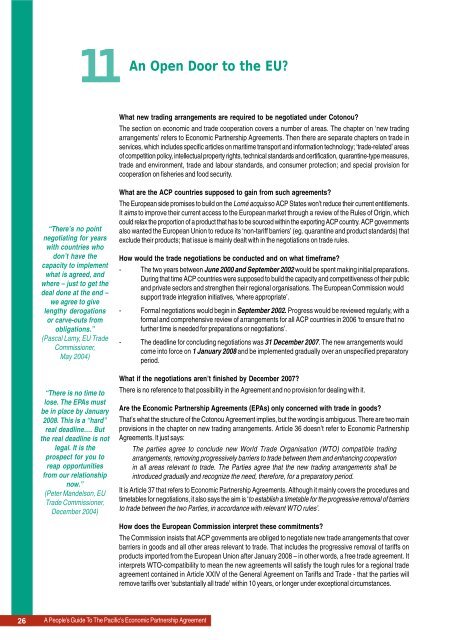REPA Booklet - Stop Epa
REPA Booklet - Stop Epa
REPA Booklet - Stop Epa
Create successful ePaper yourself
Turn your PDF publications into a flip-book with our unique Google optimized e-Paper software.
11<br />
An Open Door to the EU?<br />
What new trading arrangements are required to be negotiated under Cotonou?<br />
The section on economic and trade cooperation covers a number of areas. The chapter on ‘new trading<br />
arrangements’ refers to Economic Partnership Agreements. Then there are separate chapters on trade in<br />
services, which includes specific articles on maritime transport and information technology; ‘trade-related’ areas<br />
of competition policy, intellectual property rights, technical standards and certification, quarantine-type measures,<br />
trade and environment, trade and labour standards, and consumer protection; and special provision for<br />
cooperation on fisheries and food security.<br />
“There’s no point<br />
negotiating for years<br />
with countries who<br />
don’t have the<br />
capacity to implement<br />
what is agreed, and<br />
where – just to get the<br />
deal done at the end –<br />
we agree to give<br />
lengthy derogations<br />
or carve-outs from<br />
obligations.”<br />
(Pascal Lamy, EU Trade<br />
Commissioner,<br />
May 2004)<br />
“There is no time to<br />
lose. The EPAs must<br />
be in place by January<br />
2008. This is a “hard”<br />
real deadline…. But<br />
the real deadline is not<br />
legal. It is the<br />
prospect for you to<br />
reap opportunities<br />
from our relationship<br />
now.”<br />
(Peter Mandelson, EU<br />
Trade Commissioner,<br />
December 2004)<br />
What are the ACP countries supposed to gain from such agreements?<br />
The European side promises to build on the Lomé acquis so ACP States won’t reduce their current entitlements.<br />
It aims to improve their current access to the European market through a review of the Rules of Origin, which<br />
could relax the proportion of a product that has to be sourced within the exporting ACP country. ACP governments<br />
also wanted the European Union to reduce its ‘non-tariff barriers’ (eg. quarantine and product standards) that<br />
exclude their products; that issue is mainly dealt with in the negotiations on trade rules.<br />
How would the trade negotiations be conducted and on what timeframe?<br />
- The two years between June 2000 and September 2002 would be spent making initial preparations.<br />
During that time ACP countries were supposed to build the capacity and competitiveness of their public<br />
and private sectors and strengthen their regional organisations. The European Commission would<br />
support trade integration initiatives, ‘where appropriate’.<br />
- Formal negotiations would begin in September 2002. Progress would be reviewed regularly, with a<br />
formal and comprehensive review of arrangements for all ACP countries in 2006 ‘to ensure that no<br />
further time is needed for preparations or negotiations’.<br />
- The deadline for concluding negotiations was 31 December 2007. The new arrangements would<br />
come into force on 1 January 2008 and be implemented gradually over an unspecified preparatory<br />
period.<br />
What if the negotiations aren’t finished by December 2007?<br />
There is no reference to that possibility in the Agreement and no provision for dealing with it.<br />
Are the Economic Partnership Agreements (EPAs) only concerned with trade in goods?<br />
That’s what the structure of the Cotonou Agreement implies, but the wording is ambiguous. There are two main<br />
provisions in the chapter on new trading arrangements. Article 36 doesn’t refer to Economic Partnership<br />
Agreements. It just says:<br />
The parties agree to conclude new World Trade Organisation (WTO) compatible trading<br />
arrangements, removing progressively barriers to trade between them and enhancing cooperation<br />
in all areas relevant to trade. The Parties agree that the new trading arrangements shall be<br />
introduced gradually and recognize the need, therefore, for a preparatory period.<br />
It is Article 37 that refers to Economic Partnership Agreements. Although it mainly covers the procedures and<br />
timetables for negotiations, it also says the aim is ‘to establish a timetable for the progressive removal of barriers<br />
to trade between the two Parties, in accordance with relevant WTO rules’.<br />
How does the European Commission interpret these commitments?<br />
The Commission insists that ACP governments are obliged to negotiate new trade arrangements that cover<br />
barriers in goods and all other areas relevant to trade. That includes the progressive removal of tariffs on<br />
products imported from the European Union after January 2008 – in other words, a free trade agreement. It<br />
interprets WTO-compatibility to mean the new agreements will satisfy the tough rules for a regional trade<br />
agreement contained in Article XXIV of the General Agreement on Tariffs and Trade - that the parties will<br />
remove tariffs over ‘substantially all trade’ within 10 years, or longer under exceptional circumstances.<br />
26<br />
A People’s Guide To The Pacific’s Economic Partnership Agreement
















